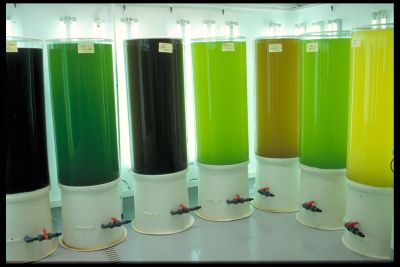Difference between revisions of "Marine Biotechnology securing alternative sources of renewable Energy"
(New page: The ocean is an untapped, potentially sustainable source of bioenergy. There are many examples of the production of bio-energy from marine organisms, but the production of biofuel from mic...) |
Dronkers J (talk | contribs) |
||
| (7 intermediate revisions by 5 users not shown) | |||
| Line 1: | Line 1: | ||
| + | {|margin style="float:right; text-align:center; font-size:85%; margin-left: 1em; width:400px" | ||
| + | |[[Image:Mbt_microalgae.jpg|400px]] | ||
| + | |- | ||
| + | |Microalgal strains with potential for biofuels. Olivier Dugornay, Ifremer | ||
| + | |} | ||
The ocean is an untapped, potentially sustainable source of bioenergy. There are many examples of the production of bio-energy from marine organisms, but the production of biofuel from microalgae presents perhaps the most promising option to harvest this huge energy potential. The theoretical production of oil from microalgae is considerably higher than that of terrestrial crops but, to achieve viability, the cost of production will need to be significantly reduced and the scale of production increased, while maintaining environmental sustainability. To cultivate microalgae for the generation of bio-energy is an important challenge for Marine Biotechnology in the 21st century. | The ocean is an untapped, potentially sustainable source of bioenergy. There are many examples of the production of bio-energy from marine organisms, but the production of biofuel from microalgae presents perhaps the most promising option to harvest this huge energy potential. The theoretical production of oil from microalgae is considerably higher than that of terrestrial crops but, to achieve viability, the cost of production will need to be significantly reduced and the scale of production increased, while maintaining environmental sustainability. To cultivate microalgae for the generation of bio-energy is an important challenge for Marine Biotechnology in the 21st century. | ||
| − | == | + | == Research priorities and objectives == |
| + | '''Overarching research target:''' | ||
| − | * | + | Development and demonstration of viable renewable energy products and processes, notably through the use of marine algae. |
| − | * | + | |
| − | *[[ | + | '''Key research priorities:''' |
| + | |||
| + | * Produce an inventory of microalgae resources for biofuel production to support optimisation of the most appropriate strains; | ||
| + | * Improve knowledge of basic biological functions, tools for steering the metabolism and cultivation methods of marine microalgae to improve the photosynthetic efficiency, enhance lipid productivity and obtain microalgae with optimum characteristics for mass cultivation (mixed & mono cultures), biofuel production and biorefinery; | ||
| + | * Develop efficient harvest, separation and purification processes for micro- and macro-algae. | ||
| + | |||
| + | ==External references== | ||
| + | http://www.marinebiotech.eu/sites/marinebiotech.eu/files/public/library/CSA%20outreach/CSA_MarineBiotech_Brochure_RM.pdf | ||
| + | http://www.marineboard.eu/file/45/download?token=XtrWSE1E | ||
| + | [[Category:Key Marine Biotechnology application areas]] | ||
Revision as of 22:11, 9 November 2018

|
| Microalgal strains with potential for biofuels. Olivier Dugornay, Ifremer |
The ocean is an untapped, potentially sustainable source of bioenergy. There are many examples of the production of bio-energy from marine organisms, but the production of biofuel from microalgae presents perhaps the most promising option to harvest this huge energy potential. The theoretical production of oil from microalgae is considerably higher than that of terrestrial crops but, to achieve viability, the cost of production will need to be significantly reduced and the scale of production increased, while maintaining environmental sustainability. To cultivate microalgae for the generation of bio-energy is an important challenge for Marine Biotechnology in the 21st century.
Research priorities and objectives
Overarching research target:
Development and demonstration of viable renewable energy products and processes, notably through the use of marine algae.
Key research priorities:
- Produce an inventory of microalgae resources for biofuel production to support optimisation of the most appropriate strains;
- Improve knowledge of basic biological functions, tools for steering the metabolism and cultivation methods of marine microalgae to improve the photosynthetic efficiency, enhance lipid productivity and obtain microalgae with optimum characteristics for mass cultivation (mixed & mono cultures), biofuel production and biorefinery;
- Develop efficient harvest, separation and purification processes for micro- and macro-algae.
External references
http://www.marinebiotech.eu/sites/marinebiotech.eu/files/public/library/CSA%20outreach/CSA_MarineBiotech_Brochure_RM.pdf http://www.marineboard.eu/file/45/download?token=XtrWSE1E